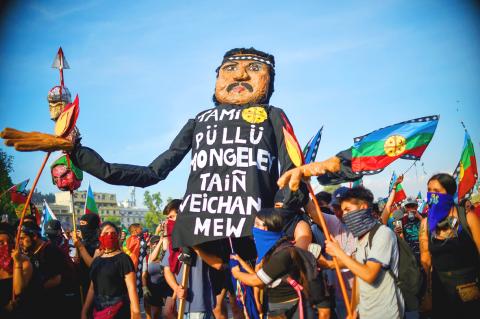Chile yesterday announced that it would stage a referendum next year to replace its dictatorship-era constitution — a key demand of protesters after nearly a month of sometimes violent civil unrest.
The charter, in force since 1980 and enacted by the former military junta of Augusto Pinochet, has been changed numerous times over th years, but it does not establish the state’s responsibility to provide education and healthcare — two demands made by millions of Chileans who have taken to the streets.
After hours of negotiation between ruling coalition and opposition lawmakers, the Chilean National Congress early yesterday agreed to hold the plebiscite in April.

Photo: AFP
The referendum will ask voters whether the constitution should be replaced and, if so, how a new charter should be drafted, Chilean Senate president Jaime Quintana said.
The unrest that began on Oct. 18 with protests against a rise in rush-hour metro fares has mushroomed into a broader outcry against the status quo, with burning, looting and daily confrontations between demonstrators and police.
The crisis is Chile’s biggest since its return to democracy in 1990, leaving 20 dead — five at the hands of state forces — and more than 1,000 injured.
While Chileans are accustomed to seeing violent clashes between police and demonstrators, a new trend is leaving them shaken: the blinding of protesters by shotgun pellets fired by state security agents.
At least 230 people have lost sight after being shot in an eye in the past month, Chile’s main medical body said.
Of those, at least 50 people will need prosthetic eyes, it said.
“This means that the patient doesn’t only lose their vision, but they lose their actual eye,” Medical College of Chile vice president Patricio Meza said.
The victims are on average 30 years old. In 80 percent of the cases, the damage is caused by the impact of a lead or rubber projectile on their eyes, Meza said.
“We are facing a real health crisis, a health emergency given that in such few days, in three weeks, we have had the highest number of cases involving serious ocular complications due to shots in the eye,” he said.
At demonstrations, it is common to see police firing pellet guns at crowds.
Often, “they’re firing at 90 degrees, which is to say, directly at the face,” Meza said, adding that most of the injured say it was the national police force who are the ones firing.
The National Institute of Human Rights has said that while it condemns violence by protesters, this does not justify “the indiscriminate use” of pellet guns by riot police.
Meza said other countries seem to follow protocols about the use of pellet guns, but in Chile, “this is clearly not happening.”

PARLIAMENT CHAOS: Police forcibly removed Brazilian Deputy Glauber Braga after he called the legislation part of a ‘coup offensive’ and occupied the speaker’s chair Brazil’s lower house of Congress early yesterday approved a bill that could slash former Brazilian president Jair Bolsonaro’s prison sentence for plotting a coup, after efforts by a lawmaker to disrupt the proceedings sparked chaos in parliament. Bolsonaro has been serving a 27-year term since last month after his conviction for a scheme to stop Brazilian President Luiz Inacio Lula da Silva from taking office after the 2022 election. Lawmakers had been discussing a bill that would significantly reduce sentences for several crimes, including attempting a coup d’etat — opening up the prospect that Bolsonaro, 70, could have his sentence cut to

China yesterday held a low-key memorial ceremony for the 1937 Nanjing Massacre, with Chinese President Xi Jinping (習近平) not attending, despite a diplomatic crisis between Beijing and Tokyo over Taiwan. Beijing has raged at Tokyo since Japanese Prime Minister Sanae Takaichi last month said that a hypothetical Chinese attack on Taiwan could trigger a military response from Japan. China and Japan have long sparred over their painful history. China consistently reminds its people of the 1937 Nanjing Massacre, in which it says Japanese troops killed 300,000 people in what was then its capital. A post-World War II Allied tribunal put the death toll

‘UNWAVERING ALLIANCE’: The US Department of State said that China’s actions during military drills with Russia were not conducive to regional peace and stability The US on Tuesday criticized China over alleged radar deployments against Japanese military aircraft during a training exercise last week, while Tokyo and Seoul yesterday scrambled jets after Chinese and Russian military aircraft conducted joint patrols near the two countries. The incidents came after Japanese Prime Minister Sanae Takaichi triggered a dispute with Beijing last month with her remarks on how Tokyo might react to a hypothetical Chinese attack on Taiwan. “China’s actions are not conducive to regional peace and stability,” a US Department of State spokesperson said late on Tuesday, referring to the radar incident. “The US-Japan alliance is stronger and more

FALLEN: The nine soldiers who were killed while carrying out combat and engineering tasks in Russia were given the title of Hero of the Democratic People’s Republic of Korea North Korean leader Kim Jong-un attended a welcoming ceremony for an army engineering unit that had returned home after carrying out duties in Russia, North Korean state media KCNA reported on Saturday. In a speech carried by KCNA, Kim praised officers and soldiers of the 528th Regiment of Engineers of the Korean People’s Army (KPA) for “heroic” conduct and “mass heroism” in fulfilling orders issued by the ruling Workers’ Party of Korea during a 120-day overseas deployment. Video footage released by North Korea showed uniformed soldiers disembarking from an aircraft, Kim hugging a soldier seated in a wheelchair, and soldiers and officials